


PYOTR (PETER) TCHAIKOVKSY 1840 - 1893 (Va, Vb, Vc)
Acknowledgements
Tchaikovsky: detail, by the Ukrainian portrait painter Nikolai Dmitrievich Kuznetsov (1850-1929), 1893 – Tretyakov Gallery, Moscow. Nadejda: pencil drawing, date and artist unknown – copy at Digital Gallery, New York Public Library, original at the Tchaikovsky House-Museum, Klin, Moscow. Rubinsteins: photograph of 1862, artist unknown. Mussorgsky: by the Russian painter Ilya Repin (1844-1930), 1881 – Tretyakov Gallery, Moscow. Smetana: by the Swedish artist Per Sodermark (1822-1889), 1858 – National Museum, Prague, Czech Republic.
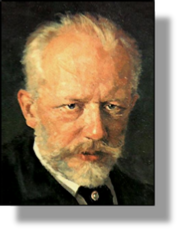 xxxxxThe Russian composer Pyotr Tchaikovsky, noted above all for his captivating melodies and his brilliant orchestration, was one of the first to gain fame outside of his home country. Apart from chamber and vocal music, his works included six symphonies, three piano concertos, a violin concerto, and a number of ballets and operas. Among his best known works are his Piano Concerto No.1, the ballets Swan Lake, Sleeping Beauty and The Nutcracker, the 1812 Overture, his opera Eugene Onegin, and his final work, his Symphony No.6.
xxxxxThe Russian composer Pyotr Tchaikovsky, noted above all for his captivating melodies and his brilliant orchestration, was one of the first to gain fame outside of his home country. Apart from chamber and vocal music, his works included six symphonies, three piano concertos, a violin concerto, and a number of ballets and operas. Among his best known works are his Piano Concerto No.1, the ballets Swan Lake, Sleeping Beauty and The Nutcracker, the 1812 Overture, his opera Eugene Onegin, and his final work, his Symphony No.6.
xxxxxTchaikovsky was born into a middle-class family in Votkinsk in the Ural Mountains, western Russia. A bright but highly sensitive boy, he took music lessons from the age of four and liked to listen to folk songs and popular pieces played on a mechanical organ - including an excerpt from Mozart’s Don Giovanni. His family moved to St. Petersburg in 1848, and he then attended a boarding school before becoming a student at the School of Jurisprudence. On completing his studies in 1859 he became a clerk in the Ministry of Justice, but he soon realised that his interest lay in music. In 1861, then aged 21, he began classes provided by the Russian Music Society, and the following year he gave up his job and began studying at the newly-established St. Petersburg Conservatory. There, taught by the Conservatory’s director Anton Rubinstein, he proved a competent musician, and in 1866 he was appointed teacher of harmony at the Moscow Conservatory, where Nikolai Rubinstein (younger brother of Anton) was the director.
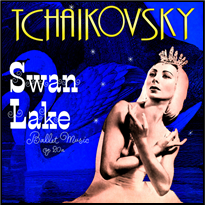
xxxxxIt was during his eleven-year stay in Moscow that he composed some of his finest works. These included his stunning Fantasy Overture, Romeo and Juliet in 1869, his Symphony No.2 (Little Russian) in 1872, his Piano Concerto No.1, in 1875, his ballet Swan Lake and his Slavonic March in 1876, and his Violin Concerto and his operatic masterpiece Eugene Onegin (based on a verse novel by Alexander Pushkin) in 1878. And it was during this period, while visiting St. Petersburg in 1868, that he became acquainted with The Mighty Five. Led by the Russian composer Mily Balakirev, and including Modest Mussorgsky, Aleksandr Borodin and Nikolai Rimsky-Korsakov, this group was eager to promote authentic Russian music in a free, open style.
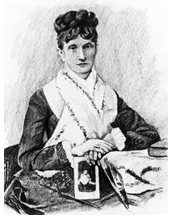 xxxxxIn 1877 - possibly to quash any rumours about his undeclared homosexuality - he married Antonina Milyukova, a young music student who had become infatuated with him. As one might expect, the marriage was a disaster, and they separated after a matter of weeks. He became so distressed that he attempted suicide by immersing himself in Moscow River. He planned to die from pneumonia but, in the event, only caught a severe chill. Itxwas around this time, however, that he made the acquaintance of Nadejda von Meck (1831-1894) (illustrated), a wealthy widow, and, as a result, his life changed for the better. She greatly admired his music and, whilst not wishing to meet him in person (she preferred to think of him “from afar”) agreed to provide him with a generous annual allowance. It was a somewhat strange arrangement, but Tchaikovsky accepted it gratefully, and this money enabled him to resign from his post at the Moscow Conservatory and concentrate his efforts on composing over the next fourteen years. Furthermore, whilst they never met, they did carry on a copious correspondence, and this enabled him to give vent to his emotions and intimate feelings without the need or fear of physical contact.
xxxxxIn 1877 - possibly to quash any rumours about his undeclared homosexuality - he married Antonina Milyukova, a young music student who had become infatuated with him. As one might expect, the marriage was a disaster, and they separated after a matter of weeks. He became so distressed that he attempted suicide by immersing himself in Moscow River. He planned to die from pneumonia but, in the event, only caught a severe chill. Itxwas around this time, however, that he made the acquaintance of Nadejda von Meck (1831-1894) (illustrated), a wealthy widow, and, as a result, his life changed for the better. She greatly admired his music and, whilst not wishing to meet him in person (she preferred to think of him “from afar”) agreed to provide him with a generous annual allowance. It was a somewhat strange arrangement, but Tchaikovsky accepted it gratefully, and this money enabled him to resign from his post at the Moscow Conservatory and concentrate his efforts on composing over the next fourteen years. Furthermore, whilst they never met, they did carry on a copious correspondence, and this enabled him to give vent to his emotions and intimate feelings without the need or fear of physical contact.
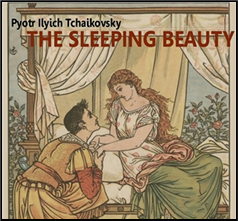 xxxxxIn the early 1880s his reputation began to grow, assisted by the production of the 1812 Overture (commemorating the Battle of Borodino), Serenade for Strings, Capriccio Italien and the Manfred Symphony, based on the poem by Lord Byron. From 1887 Tchaikovsky embarked on a series of highly successful concert tours. Over the next six years he conducted his own works in major cities across Europe and the United States. His visit to America in 1891 included a visit to New York, where he took part in the opening of the Music Hall (later renamed Carnegie Hall), and concerts in Philadelphia and Baltimore. And on his return he visited London in the summer of 1893 and received an honorary doctorate from the University of Cambridge. To this period belongs his ballet, The Sleeping Beauty, and his opera The Queen of Spades (also based on Pushkin). But it was also in this period, in 1890, that Madam von Meck, fearing that she faced financial ruin, suddenly stopped her annual allowance and her letters. By then he had a sizeable income of his own, but this decision was seen as a betrayal and triggered off a period of deep depression.
xxxxxIn the early 1880s his reputation began to grow, assisted by the production of the 1812 Overture (commemorating the Battle of Borodino), Serenade for Strings, Capriccio Italien and the Manfred Symphony, based on the poem by Lord Byron. From 1887 Tchaikovsky embarked on a series of highly successful concert tours. Over the next six years he conducted his own works in major cities across Europe and the United States. His visit to America in 1891 included a visit to New York, where he took part in the opening of the Music Hall (later renamed Carnegie Hall), and concerts in Philadelphia and Baltimore. And on his return he visited London in the summer of 1893 and received an honorary doctorate from the University of Cambridge. To this period belongs his ballet, The Sleeping Beauty, and his opera The Queen of Spades (also based on Pushkin). But it was also in this period, in 1890, that Madam von Meck, fearing that she faced financial ruin, suddenly stopped her annual allowance and her letters. By then he had a sizeable income of his own, but this decision was seen as a betrayal and triggered off a period of deep depression.
xxxxxIt was in February 1893, following the production of his Christmas ballet The Nutcracker, that Tchaikovsky began work on his Symphony No. 6, one of his greatest and best known works. Completed in the August at the second attempt, it was named the Pathétique (in the sense of passionate or emotional) and given its first performance at St. Petersburg in the October. It was, he wrote, “the best of my compositions”, but nine days later he was dead, struck down, it was officially recorded, by contracting cholera. As a result the final, slow movement - brooding in tone, mournful in tempo, and fading away at its ending - has come to been seen by many as an expression of deep foreboding. And this belief has been heightened by a long-running rumour that the composer did not die of cholera but committed suicide, fearing that one of his homosexual affairs (then socially unacceptable) was about to be made public. There is no firm evidence to support this rumour, but after the first night Tchaikovsky told Rimsky-Korsakov that the work did have a meaning, but it was to remain an enigma.
xxxxxA vast amount of Tchaikovsky’s music has remained extremely popular with the general public. The emotional power he infused in his compositions - be it in concerto, symphony, opera or ballet - the delightful, melodic passages he created, and the brilliant way in which he master-minded the instruments of the orchestra to impose his will, contributed to his lasting success. He was, first and foremost, of course, a musical patriot. Consciously or unconsciously, much of Russian song and dance pervades his work, and in this respect he has an affiliation with the nationalist group known as The Mighty Five. Indeed, some critics saw him as the sixth member of this circle, but whilst his music had a distinct Russian flavour, he was basically a conservative who believed in form, even though, as he admitted himself, he did not always achieve it. Furthermore, as a professional he encompassed in his music the wider Romantic movement of his day. He could create joy, exhilaration and pathos with equal facility, and in his ballets and best operas his music mirrored and enhanced the drama on stage.
xxxxxLike his music, Tchaikovsky was highly emotional. Shy by nature and of a nervous disposition, he was always terrified lest his homosexuality became known. Outwardly he seemed reasonably at ease in other people’s company, but when alone he would often dissolve into tears from the sheer strain of hiding his innermost fears and feelings. In his diary he wrote of his despair at meeting people and of his desire “to flee from them to the ends of the world”. Nor did his mental condition improve. Even after he had gained international recognition, he doubted his ability as a composer, suffered from a constant headache, and took to drink to ease his nervous state. As a musician he had no time whatsoever for Brahms and Handel, but he did admire some works by Beethoven, Bach, Haydn and Gluck. In contrast, he greatly valued the skill of Delibes, and he regarded Mozart as “a musical Christ”.
Including:
Modest Mussorgsky
and Bedrich Smetana

Vb-1862-1880-Vb-1862-1880-Vb-1862-1880-Vb-1862-1880-Vb-1862-1880-Vb-1862-1880-Vb
xxxxxPyotr Tchaikovsky was one of the first Russian composers to gain fame outside of his homeland. His compositions, noted for their fund of melody and brilliant orchestration, are amongst the most popular of all time, and, apart from chamber and vocal music, include six symphonies, three piano concertos and a number of ballets and operas. Much of his music was imbued with Russian emotion and fervour, but at the same time it captured the style of the wider Romantic movement, and this made his works extremely popular across Europe and in the United States. A highly sensitive homosexual, his marriage in 1877 proved a disaster, but it was in that year that he received a generous allowance from a wealthy widow, Nadajda von Meck, and for the next fourteen years he was able to concentrate his efforts on composition. His best known works are the fantasy overture Romeo and Juliet (1870), the 1812 Overture (commemorating the Battle of Borodino) (1882), the Ballets Swan Lake (1877), Sleeping Beauty (1890) and The Nutcracker (1892), the Piano Concerto No.1 (1875), the Violin Concerto (1878), the operas Eugene Onegin (1879) and The Queen of Spades (1890), and his last composition - his Symphony No.6 (Pathétique) - a work which, in its last, poignant passages, seems to anticipate his death just nine days after its first performance in October 1893. Apart from extensive tours in Europe and America, he spent most of his life in Moscow and St. Petersburg.

xxxxxTchaikovsky was one of the foremost composers of the 19th century. It might be argued that he was not the greatest of his time, but he was certainly the most popular. He is valued especially today for his fund of melody and his consummate skill in orchestration. Furthermore, in the musical sense he put Russia on the map, completing in full the work initiated in this respect by his countryman Mikhail Glinka earlier in the century. His works are full of Russian emotion and fervour. He said himself that he was a Russian “in the fullest sense of the word”. However, at the same time he incorporated this Russian spirit within the romantic movement sweeping through western Europe in his time, thereby captivating audiences across the musical world. Therein lay his greatness.
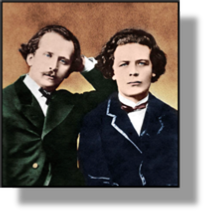 xxxxxIncidentally, the Brothers Rubinstein, both virtuoso pianists and prominent conductors, played a major part in the development of musical skills within Russia. Anton Rubinstein (1829-1894) (on the right) opened the Russian Musical Society at St. Petersburg in 1859, and three years later established the Conservatory there. As a pianist he was considered a rival to Franz Liszt, and he spent a number of years on tour, giving concerts in the United States as well as in Europe. His younger brother, Nicolai Rubinstein (1835-1881) founded the Moscow branch of the Russian Musical Society in 1859, and the Conservatory in 1866, the year that Tchaikovsky joined the staff. Later, on hearing the composer’s First Piano Concerto he complained that it was terribly noisy and refused to play at its premiere! That honour went to the German pianist Hans von Bulow. ……
xxxxxIncidentally, the Brothers Rubinstein, both virtuoso pianists and prominent conductors, played a major part in the development of musical skills within Russia. Anton Rubinstein (1829-1894) (on the right) opened the Russian Musical Society at St. Petersburg in 1859, and three years later established the Conservatory there. As a pianist he was considered a rival to Franz Liszt, and he spent a number of years on tour, giving concerts in the United States as well as in Europe. His younger brother, Nicolai Rubinstein (1835-1881) founded the Moscow branch of the Russian Musical Society in 1859, and the Conservatory in 1866, the year that Tchaikovsky joined the staff. Later, on hearing the composer’s First Piano Concerto he complained that it was terribly noisy and refused to play at its premiere! That honour went to the German pianist Hans von Bulow. ……
xxxxx…… Tchaikovsky’ patron, Nadejda von Meck, a fiercely independent and domineering woman, also assisted other artists, including Nicolai Rubinstein and the French composer Claude Debussy, whom she hired as a music tutor to her daughters.
xxxxxThe Russian composer Modest Mussorgsky (1839-1881) was a member of The Mighty Five, a group of amateur musicians producing authentic Russian music. His works included St. John’s Night on the Bare Mountain (1867), based on a story by the Russian writer Nikolai Gogol; the opera Boris Godunov (1874), based on a drama of that name by the Russian author Aleksandre Pushkin; a cycle of piano pieces entitled Pictures at an Exhibition (1874); and Songs and Dances of Death (1875). A man who had a deep love of his homeland, his music captures the spirit of Russia, but its originality was not appreciated in his lifetime, and after his death a number of composers, including his close friend Rimsky Korsakov, revised his major works to make them more acceptable to public taste. He drank heavily throughout his life and died of alcoholism at the age of 42.
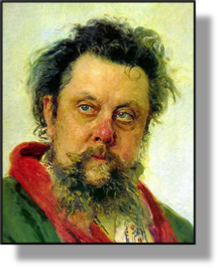 xxxxxAs we have seen, Modest Mussorgsky (1839-1881), was a member of The Mighty Five, a group of amateur musicians - led by the Russian composer Mily Balakirev - which was bent on promoting authentic Russian music. He served as a guards’ officer early on, but joined The Mighty Five in 1857 and the following year resigned his commission to give more of his time to music. In that year he gained valuable theatrical experience by assisting in a production of Glinka’s opera A Life for the Tsar. However, the emancipation of the serfs in 1861 brought financial ruin. He was obliged to spend two years overseeing the rundown of the family estate, and thereafter was forced to work as a civil servant in order to make money.
xxxxxAs we have seen, Modest Mussorgsky (1839-1881), was a member of The Mighty Five, a group of amateur musicians - led by the Russian composer Mily Balakirev - which was bent on promoting authentic Russian music. He served as a guards’ officer early on, but joined The Mighty Five in 1857 and the following year resigned his commission to give more of his time to music. In that year he gained valuable theatrical experience by assisting in a production of Glinka’s opera A Life for the Tsar. However, the emancipation of the serfs in 1861 brought financial ruin. He was obliged to spend two years overseeing the rundown of the family estate, and thereafter was forced to work as a civil servant in order to make money.
xxxxxIn his music Mussorgsky was greatly influenced by Russian folk music and legend. His first major work St. John’s Night on the Bare Mountain, produced in 1867, was based on a short story by the Russian novelist Nikolai Gogol. It was a work which, as he put it, was “grown in our country’s soil and nurtured on Russian bread”. Unfortunately its harsh beauty, unusual style and ghostly theme was not fully appreciated by his colleagues, and it was not performed publicly in his life time.
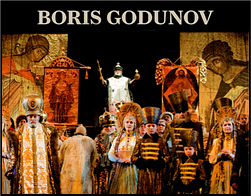 xxxxxIn 1868 he turned his hand to opera. After abandoning two ambitious projects - Salammbo and The Marriage - he completed his masterpiece, Boris Godunov, in 1869. This was revised in the early 1870s and first performed at St. Petersburg in January 1874. Based on the drama of the same name by Aleksandre Pushkin, this powerful psychological portrait of the Russian Tsar - accused by some of having murdered the rightful heir - was received by the public with enthusiasm and marked the peak of his career, but the critics were openly hostile. The work was described as noisy, chaotic, immature and lacking in cohesion. In private some regarded Mussorgsky as an idiot, and Tchaikovsky saw him as “a hopeless case” whose music was “most vulgar” and “a vile parody of music”. The opera was performed 21 times during his life time, but was withdrawn from the repertory in 1882, probably due to opposition from the imperial family.
xxxxxIn 1868 he turned his hand to opera. After abandoning two ambitious projects - Salammbo and The Marriage - he completed his masterpiece, Boris Godunov, in 1869. This was revised in the early 1870s and first performed at St. Petersburg in January 1874. Based on the drama of the same name by Aleksandre Pushkin, this powerful psychological portrait of the Russian Tsar - accused by some of having murdered the rightful heir - was received by the public with enthusiasm and marked the peak of his career, but the critics were openly hostile. The work was described as noisy, chaotic, immature and lacking in cohesion. In private some regarded Mussorgsky as an idiot, and Tchaikovsky saw him as “a hopeless case” whose music was “most vulgar” and “a vile parody of music”. The opera was performed 21 times during his life time, but was withdrawn from the repertory in 1882, probably due to opposition from the imperial family.
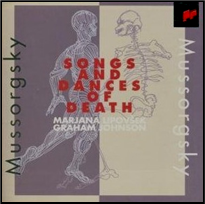
xxxxxBut though 1874 saw the peak of his career, his decline was quite rapid from then on. The group of five was breaking up and alcoholism, for many years a drag on his health, now began to take its toll. He began to have “fits of madness”. However, he managed to produce Pictures at an Exhibition, in 1874, a cycle of imaginative piano pieces conjuring up each painting, and the following year composed a song cycle entitled Sunless Songs and Dances of Death. Then in 1879 he went on a three-month tour of Russia and this marked the end of his career. In 1880 he was dismissed from his job and suffered a series of strokes. He died in hospital in March 1881, just a few days after his 42nd birthday, and left a number of commissions unfinished.
xxxxxMussorgsky had a deep love of all that symbolised Russia, and he attempted to capture the spirit of his homeland in a style that was fresh, owing nothing to traditional Western music. But the originality of his music, particularly the strength of his dramatic expression, was not appreciated. As a result, many of his works were revised by others. His close friend Rimsky-Korsakov, for example, contending that Mussorgsky had technical shortcomings, rearranged his St. John’s Night on the Bare Mountain, producing it as a successful fantasy for orchestra in 1886, and ten years later he completed a revised version of Boris Godunov. And Pictures at an Exhibition was re-orchestrated by the French composer Maurice Ravel.
xxxxxIncidentally, the portrait of Mussorgsky above is by the Russian artist Ilya Repin (1844-1930). It was painted in hospital a few days before the composer’s death. Repin produced historical and contemporary subjects, including a series of works on the theme of the revolutionary movement in Russia. One of his most famous paintings is Ivan the Terrible and his Son Ivan of 1885, showing the scene soon after the Tsar had killed his son in a fit of rage.
xxxxxAnother composer at this time who showed a passionate love for his homeland was Bedrich Smetana (1824-1884). Much of his work is full of the songs and rhythms of the folk songs and dances of his native Bohemia, and some of his works provided patriotic expression at a time when attempts were being made to overthrow Austrian rule. His major compositions - the comic opera The Bartered Bride, first performed in 1866, and his cycle of symphonic poems entitled My Country, produced in 1879 - helped to found the Czech national school. From 1843 he spent much of his life in Prague, and it was here that he assisted in the establishment of the Provisional Theatre, the Society of Artists, and the Philharmonic Society, and these contributed much to the development of Bohemian music and culture. A brilliant pianist and violinist, he was conductor to the Philharmonic Society in Goteborg, Sweden, in the late 1850s, and at the Provisional Theatre in Prague from 1866 to 1874.
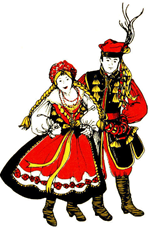
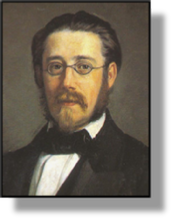 xxxxxAnother composer at this time who had a passionate love for his homeland was Bedrich Smetana (1824-1884). A great deal of his music is alive with the melodies and rhythms of the folk songs and dances of his beloved Bohemia. And his music also served as a glowing expression of national pride at a time when Bohemia was attempting to gain its independence from the Austrian Habsburg Empire. He himself took part in the failed uprising against Austrian rule in 1848.
xxxxxAnother composer at this time who had a passionate love for his homeland was Bedrich Smetana (1824-1884). A great deal of his music is alive with the melodies and rhythms of the folk songs and dances of his beloved Bohemia. And his music also served as a glowing expression of national pride at a time when Bohemia was attempting to gain its independence from the Austrian Habsburg Empire. He himself took part in the failed uprising against Austrian rule in 1848.
xxxxxBorn in Litomysl in eastern Bohemia, he showed enormous musical talent at an early age both as a pianist and a violinist. He was playing the piano before the Austrian Emperor at the age of six. In 1843 he moved to Prague to continue his studies. He made a living as music master to an aristocratic family, and after his marriage to the pianist Katerina Kolarova, went to live in Goteborg, Sweden in 1856. There he was the conductor to the newly established Philharmonic Society, composed a great deal of piano music, and gave piano and chamber music recitals.
xxxxxAfter the death of his wife he went on a tour of Germany, Holland and Sweden to make some money before returning to Prague. It was then, in 1861, that he took part in the founding of the Provisional Theatre, the Society of Artists, and the Philharmonic Society, all important contributions to the development of Bohemian music and culture. In 1866 he was appointed conductor at the Provisional Theatre and he held this post for eight years.
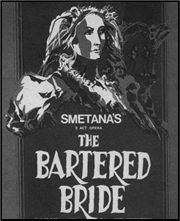 xxxxxHis major work, the sparkling comic opera The Bartered Bride, was premiered at the Provisional Theatre, Prague, in 1866. Set in a small village and centred around a story in which true love eventually prevails, it was not an immediate success. However, after revision, its second showing in 1870 was well received, and the opera gained worldwide fame after a performance in Vienna in 1892. This work, with its traditional Bohemian dances like the polka and the fiery furiant - together with his cycle of symphonic poems entitled My Country, produced in 1879 - played a major part in the development of a predominantly Czech style of music. Other works which helped in this respect included the operas The Brandenburgers in Bohemia of 1866, Dalibor of 1868, and The Two Widows of 1874, a number of Czech dances, and some piano and chamber music.
xxxxxHis major work, the sparkling comic opera The Bartered Bride, was premiered at the Provisional Theatre, Prague, in 1866. Set in a small village and centred around a story in which true love eventually prevails, it was not an immediate success. However, after revision, its second showing in 1870 was well received, and the opera gained worldwide fame after a performance in Vienna in 1892. This work, with its traditional Bohemian dances like the polka and the fiery furiant - together with his cycle of symphonic poems entitled My Country, produced in 1879 - played a major part in the development of a predominantly Czech style of music. Other works which helped in this respect included the operas The Brandenburgers in Bohemia of 1866, Dalibor of 1868, and The Two Widows of 1874, a number of Czech dances, and some piano and chamber music.
xxxxxIn 1874, due to syphilis, Smetana went completely deaf, but he continued to compose. He produced his symphonic poems in 1879 and staged his festival opera Libuse in Prague in 1881. Two years later, however, he became insane, and died in an asylum in 1884. Today, as founder of the Czech national school - alongside his younger compatriot Antonin Dvorȧk - Smetana is held in high esteem by the Czech people he served so well.
xxxxxIncidentally, Smetana greatly admired the Hungarian composer Franz Liszt, and it was due to his encouragement that he opened a piano school in Prague in 1848. ……
xxxxx…… The Smetana Society, established in Prague in 1931, maintains a museum dedicated to the composer’s life and work.






 xxxxxThe Russian composer Pyotr Tchaikovsky, noted above all for his captivating melodies and his brilliant orchestration, was one of the first to gain fame outside of his home country. Apart from chamber and vocal music, his works included six symphonies, three piano concertos, a violin concerto, and a number of ballets and operas. Among his best known works are his Piano Concerto No.1, the ballets Swan Lake, Sleeping Beauty and The Nutcracker, the 1812 Overture, his opera Eugene Onegin, and his final work, his Symphony No.6.
xxxxxThe Russian composer Pyotr Tchaikovsky, noted above all for his captivating melodies and his brilliant orchestration, was one of the first to gain fame outside of his home country. Apart from chamber and vocal music, his works included six symphonies, three piano concertos, a violin concerto, and a number of ballets and operas. Among his best known works are his Piano Concerto No.1, the ballets Swan Lake, Sleeping Beauty and The Nutcracker, the 1812 Overture, his opera Eugene Onegin, and his final work, his Symphony No.6.
 xxxxxIn 1877 -
xxxxxIn 1877 - xxxxxIn the early 1880s his reputation began to grow, assisted by the production of the 1812 Overture (commemorating the Battle of Borodino), Serenade for Strings, Capriccio Italien and the Manfred Symphony, based on the poem by Lord Byron. From 1887 Tchaikovsky embarked on a series of highly successful concert tours. Over the next six years he conducted his own works in major cities across Europe and the United States. His visit to America in 1891 included a visit to New York, where he took part in the opening of the Music Hall (later renamed Carnegie Hall), and concerts in Philadelphia and Baltimore. And on his return he visited London in the summer of 1893 and received an honorary doctorate from the University of Cambridge. To this period belongs his ballet, The Sleeping Beauty, and his opera The Queen of Spades (also based on Pushkin). But it was also in this period, in 1890, that Madam von Meck, fearing that she faced financial ruin, suddenly stopped her annual allowance and her letters. By then he had a sizeable income of his own, but this decision was seen as a betrayal and triggered off a period of deep depression.
xxxxxIn the early 1880s his reputation began to grow, assisted by the production of the 1812 Overture (commemorating the Battle of Borodino), Serenade for Strings, Capriccio Italien and the Manfred Symphony, based on the poem by Lord Byron. From 1887 Tchaikovsky embarked on a series of highly successful concert tours. Over the next six years he conducted his own works in major cities across Europe and the United States. His visit to America in 1891 included a visit to New York, where he took part in the opening of the Music Hall (later renamed Carnegie Hall), and concerts in Philadelphia and Baltimore. And on his return he visited London in the summer of 1893 and received an honorary doctorate from the University of Cambridge. To this period belongs his ballet, The Sleeping Beauty, and his opera The Queen of Spades (also based on Pushkin). But it was also in this period, in 1890, that Madam von Meck, fearing that she faced financial ruin, suddenly stopped her annual allowance and her letters. By then he had a sizeable income of his own, but this decision was seen as a betrayal and triggered off a period of deep depression. 

 xxxxxIncidentally, the Brothers Rubinstein, both virtuoso pianists and prominent conductors, played a major part in the development of musical skills within Russia. Anton Rubinstein (1829-
xxxxxIncidentally, the Brothers Rubinstein, both virtuoso pianists and prominent conductors, played a major part in the development of musical skills within Russia. Anton Rubinstein (1829- xxxxxAs we have seen, Modest Mussorgsky (1839-
xxxxxAs we have seen, Modest Mussorgsky (1839- xxxxxIn 1868 he turned his hand to opera. After abandoning two ambitious projects -
xxxxxIn 1868 he turned his hand to opera. After abandoning two ambitious projects -

 xxxxxAnother composer at this time who had a passionate love for his homeland was Bedrich Smetana (1824-
xxxxxAnother composer at this time who had a passionate love for his homeland was Bedrich Smetana (1824- xxxxxHis major work, the sparkling comic opera The Bartered Bride, was premiered at the Provisional Theatre, Prague, in 1866. Set in a small village and centred around a story in which true love eventually prevails, it was not an immediate success. However, after revision, its second showing in 1870 was well received, and the opera gained worldwide fame after a performance in Vienna in 1892. This work, with its traditional Bohemian dances like the polka and the fiery furiant -
xxxxxHis major work, the sparkling comic opera The Bartered Bride, was premiered at the Provisional Theatre, Prague, in 1866. Set in a small village and centred around a story in which true love eventually prevails, it was not an immediate success. However, after revision, its second showing in 1870 was well received, and the opera gained worldwide fame after a performance in Vienna in 1892. This work, with its traditional Bohemian dances like the polka and the fiery furiant -

